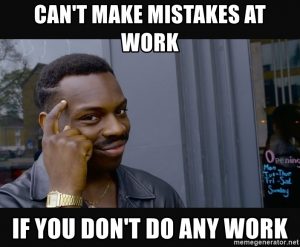 Exactly what is “Quiet Quitting?”
Exactly what is “Quiet Quitting?”
The current definition from Wikipedia says, “Quiet quitting is an informal term for the practice of reducing the amount of effort one devotes to one’s job, such as by stopping the completion of any tasks not explicitly stated in the job description. The term implies that this is done secretly or without notifying one’s boss or manager.”
Please note that a couple of assumptions in this definition make it a little dangerous.
The first assumption is that “the task is not explicitly stated in the job description.” Most job descriptions are worded vaguely enough that many tasks can be implied rather than stated. Most are tasks that would be natural follow-ups to an already completed task, such as a Thank You note to a vendor who went above and beyond to get supplies sent. These follow-ups can’t all be listed in a job description without it becoming a book rather than a document!
The second assumption is “done secretly or without notifying one’s boss or manager.” Unless you work in a sealed vault with no other employees and your manager is deaf and blind – someone will notice.
In a pre-Covid office environment, this sort of “quiet quitting” would be noticed fairly quickly – first by the co-workers and then by the supervisors. Our current hybrid (part-time office, part-time work from home) might take a little longer.
Most often, the “quiet quitter” has decided that their work is not being compensated as it should be, so they only give what they think they’re getting paid for. That’s a sad case and most often results in the quitter leaving the organization – sometimes involuntarily. An alert manager can often interrupt this behavior by offering training, moving to a different department, or helping in overcoming other challenges in a way the employee sees as profitable for them.
We have all seen another version of the “quiet quitter,” and there is at least one in every office. I call this person the “I never got started to begin with.” This person went to work the first day with no intention of setting the world on fire. Their entire purpose is to get a paycheck with the least effort required. In his article “I tried Quiet Quitting before it was cool…” (https://www.marketwatch.com/story/i-tried-quiet-quitting-before-it-was-cool-and-regretted-it-ever-since-11661607277) George Passy compares himself with George Costanza from Seinfeld. Costanza’s entire focus was on NOT working and still getting a paycheck. Can you imagine how hard the other employees had to work to carry old George and do their own work?
How do you deal with a “quiet quitter” or a “loud quitter” (as described here: https://www.gallup.com/workplace/398306/quiet-quitting-real.aspx) without just leaving your current job?
You don’t. Recognizing the symptoms is important, but you are not the cure. The company you work for needs to change its culture. A more proactive training program for anyone who wants to participate, incentives for above and beyond performance, and just plain appreciation for a job well done are important to every employee and can make a big difference to the “quiet quitter.”
If you are a “quiet quitter,” you are in the wrong workplace. You can continue your subliminal protest or do something about your situation. Start by doing some internal searching. What, specifically, got you to where you are? Talk to your manager and try to find a solution. If that isn’t possible, it is time to start looking for a company that better reflects your definition of a good place to work, where you can put your best foot forward without feeling as though you are being underpaid and overworked.
